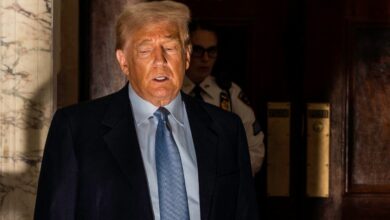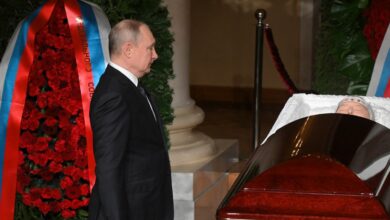Lebanon is desperate for change but Sunday’s election is unlikely to help

Lebanon goes to the polls on Sunday for the first general election since a severe economic and political crisis hit the country in late 2019.
In the last three years, the Lebanese pound, has lost more than 90 per cent of its value, trapping the vast majority of the population into poverty, according to the United Nations.
The economic meltdown and the country’s political instability triggered a series of protests that began in 2019, also known as the 17 October Revolution or Thawra (revolution).
Civil society organisations have joined those on the streets to protest against the current sectarian political establishment, accusing it of corruption and being accountable for the economic freefall and its consequences.
But although Lebanon is a country in desperate need of change, Sunday’s election is unlikely to help.
Civil society groups, activists and citizens involved in mass protests have created a fragmented opposition, lessening the likelihood that independent candidates can overturn the current political class and gain enough seats to trigger a change.
The last three years have shown that the Lebanese state has failed to provide basic services. They also showed how sectarian political parties have pushed back mass protests and dispersed public anger by ignoring political demands or accusing each other of maintaining and entrenching the status quo.
Lebanon was plunged into a financial meltdown after the collapse of a Ponzi scheme, in which fresh money was borrowed on the guarantee of high-interest payouts. However, the collapse forced private banks to lock depositors’ dollar accounts. Still today, nobody has been held accountable for this economic collapse.
Such a financial and economic situation created a multi-dimensional crisis that hit all sectors of society, including a lack of electricity all across the country, uncontrolled inflation, depletion of living standards, the crumbling of the middle class, and a mass exodus from the country.
The Beirut blast in August 2020 that killed more than 218 people and left more than 6,500 injured brought the Lebanese population to a new level of discontent and anger.
The explosion at Beirut port soon became the symbol of the corruption and negligence of the political class, and it exacerbated the dissatisfaction of the population towards the traditional political parties, seen as the culprit of the tragedy. Furthermore, the political attempts to hinder the investigations over the blast has led to the politicisation of the inquiry, polarised public opinion and exacerbated resentment.
Lebanese civil society groups and activists have tried to press the government and MPs to hold accountability for the economic disaster. They protested across the country by blocking roads and storming public institutions and politicians’ private households. On social media, activists carried out doxing activities.
However, these and other events that occurred in the last three years may not be enough to change the political scene in Sunday’s general election.
Since the end of the civil war in 1990, the Lebanese political system has distributed power among its religious communities, establishing a political class that has treated the administration of the state for its own interests.
According to the power-sharing system, the Lebanese presidency is a Maronite Christian, the prime minister a Sunni Muslim, and the speaker of parliament a Shiite.
Currently, the Shiite Hezbollah party and its allies, including the Shiite Amal party and the Christian Free Patriotic Movement (FPM), lead the majority of the parliament.
The elections are not expected to change much. It is hard to predict who will win on Sunday and, in a country desperate for change, it is likely that the current composition of the parliament will change drastically.
While the FPM is expected to lose seats, which would also weaken the leverage of Hezbollah and its allies in parliament, the Christian Lebanese Forces (LF) party, led by Samir Geagea, might gain some seats.
The established parties are expected to retain power but some independents are pushing for a political breakthrough.





